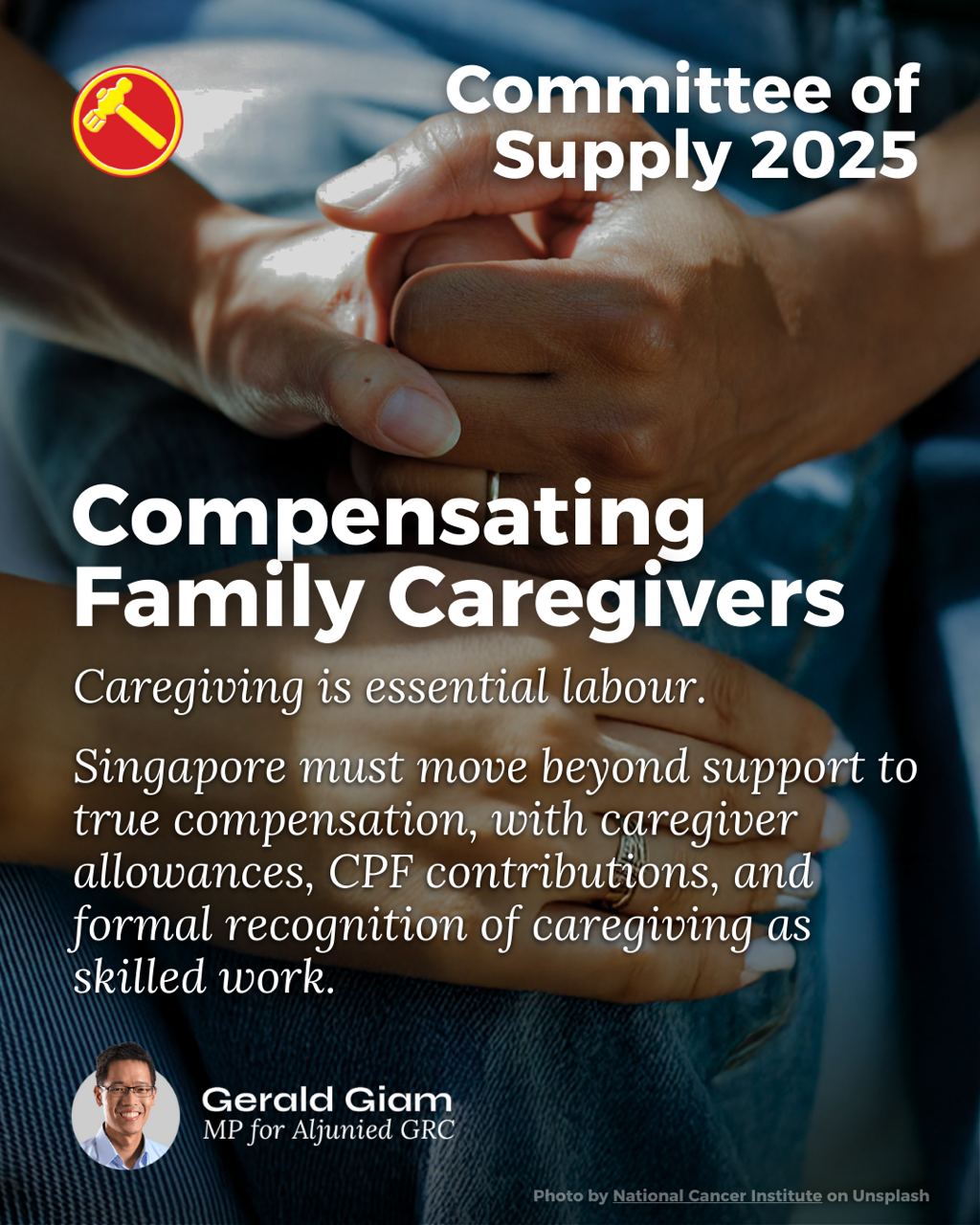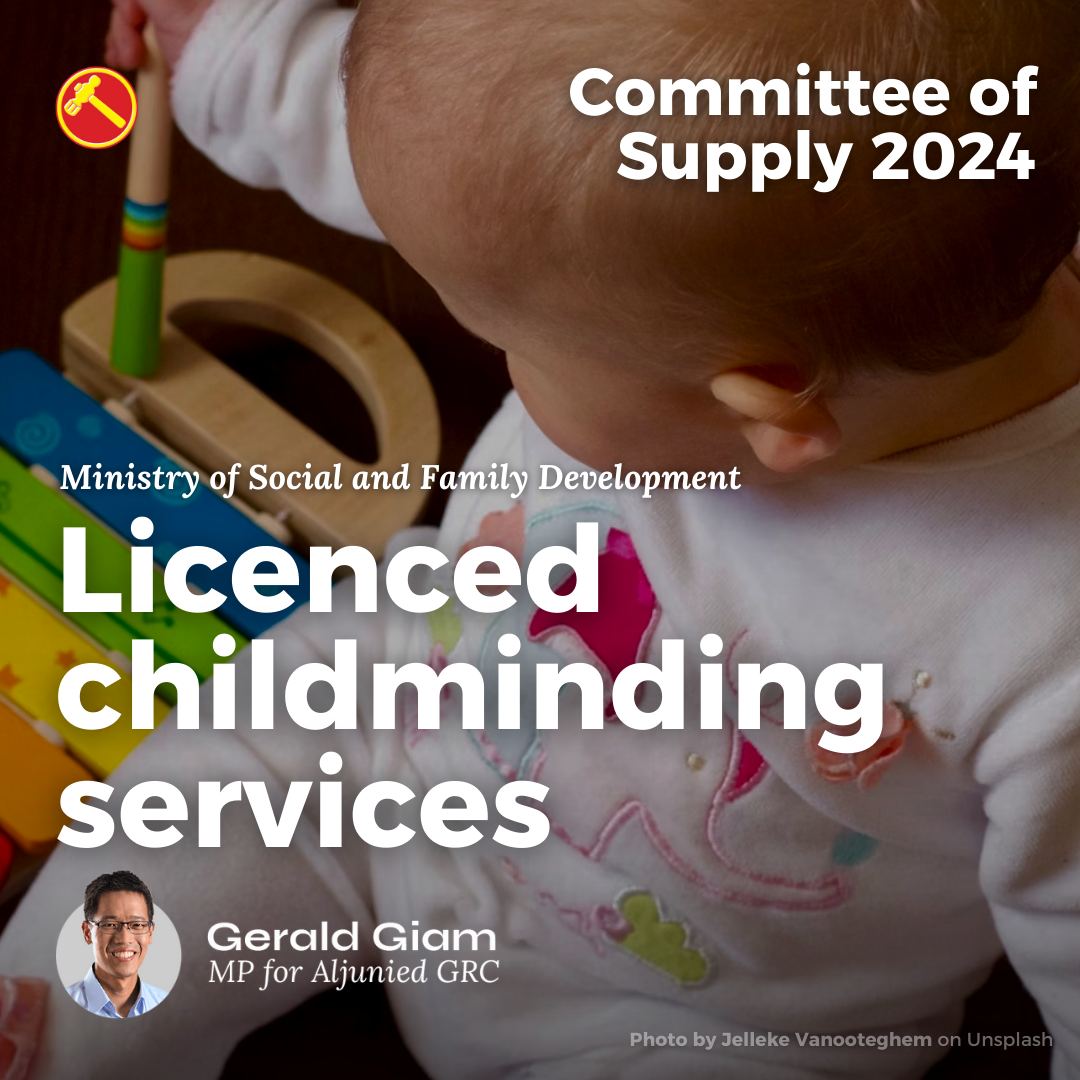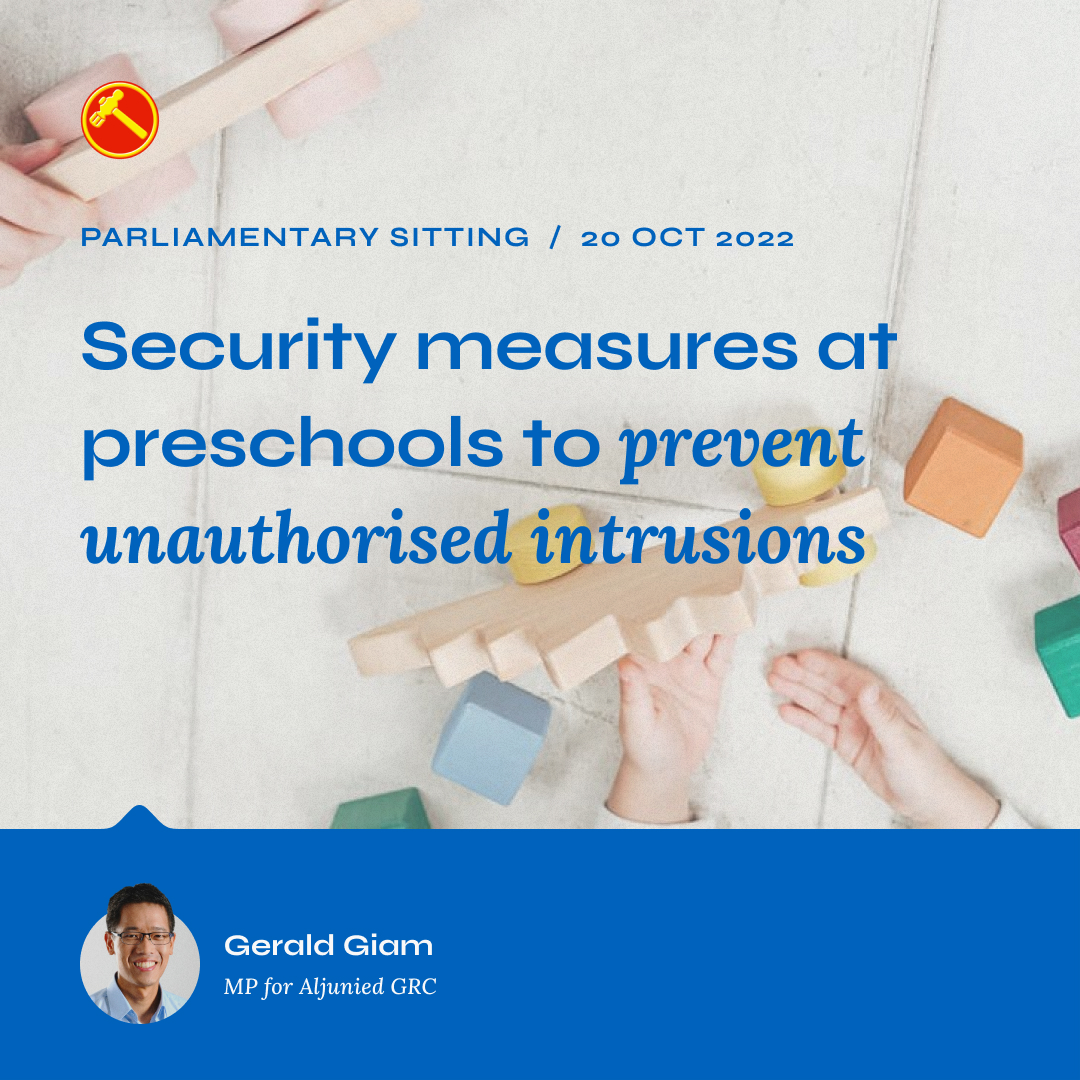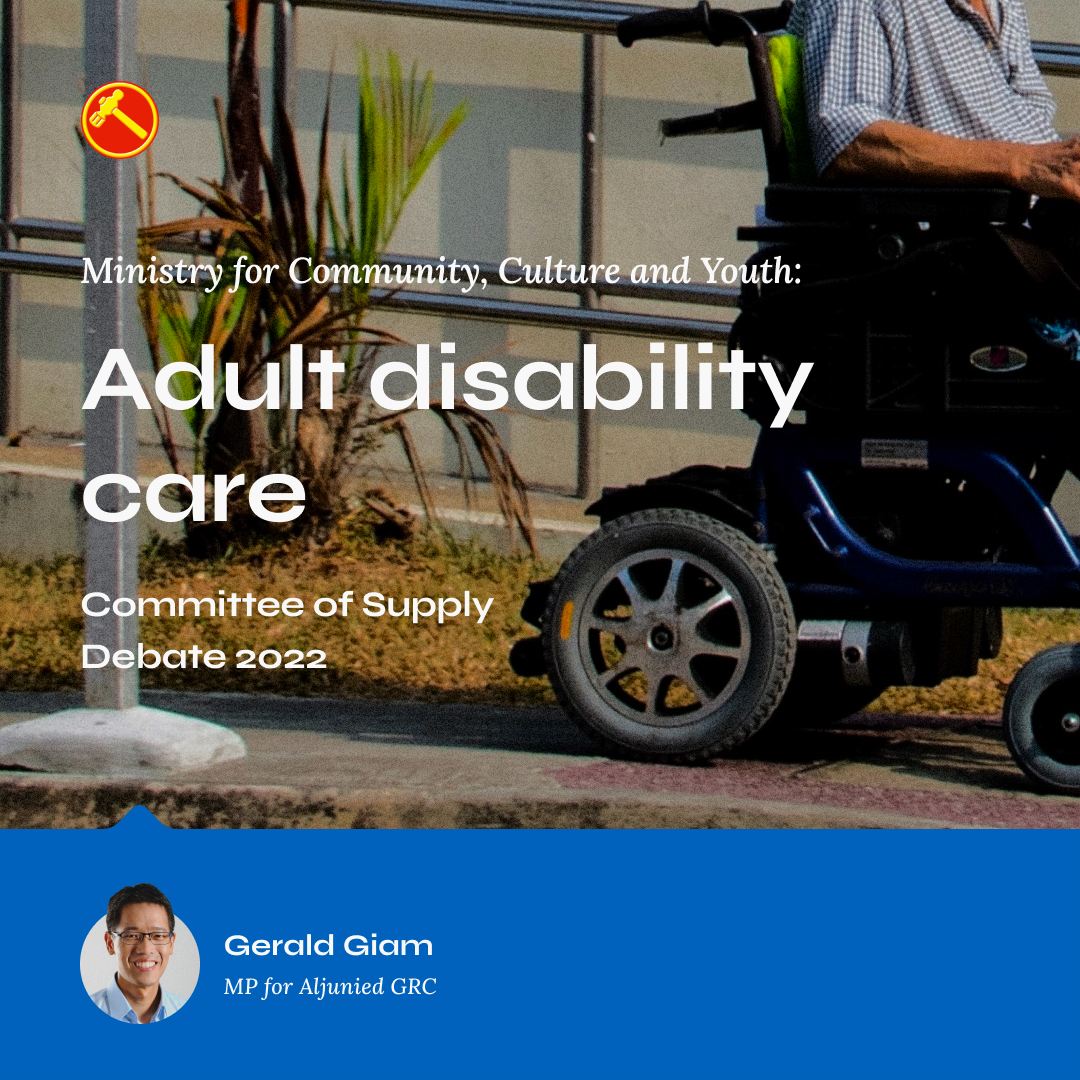Whenever I visit the funeral wakes of my constituents, I try to speak with their caregiver to offer them comfort and find out how I can provide assistance to them and their families. As I listen to them relate how they looked after their loved ones in their final years, I am filled with admiration for their immense dedication and sacrifice.
I have spoken to an elderly wife who changed the stoma bags of her husband, who was a cancer patient, for a period of time until he passed on. I have conversed with a son in his 50s, who changed his elderly mother’s soiled diapers several times a day, in a reversal of parent-child roles. I have a 72-year old resident who continues to juggle her roles working as a cleaner and the sole caregiver to her disabled adult son and mentally incapacitated husband.
These unsung heroes press on out of filial devotion to parents, duty to spouses, responsibility to their adult children and, most importantly, love for their family members.
Unlike caregivers of young children, caregivers of elderly or disabled persons face a heavier load over time as the health of their loved ones deteriorates. They do not experience the same delight of young parents watching their children growing up. Their care recipients may not be able to express their appreciation well, or may even inadvertently make hurtful remarks due to conditions like dementia.
For caregivers, every day brings new challenges and new heartaches, until that inevitable day when they see their loved ones pass on. Caregivers of children with disabilities face an additional stressor of worrying about who will care for their children if they outlive them.
It is a very heavy burden to carry. We, as a nation, society and community, can and should do much more to share some of the weight on caregivers’ shoulders.
In 2010, approximately 8% of residents aged between 18 and 69 years provided regular care to a friend or family member, with 37% of caregivers reporting that they had been providing care for over a decade. These percentages have surely gone up since then, and will likely increase further, given our ageing population.
In my speech today, I will focus on Area 2 of the White Paper – the caregiving aspect. While caregivers in Singapore are more often women than men, I will not take a gender-specific approach to the problems or solutions. The role of caregiving does not solely apply to any gender and most certainly should not be borne only by women.
The costs of informal care
Unpaid caregiving of family members incurs substantial direct expenses and opportunity costs.
According to a 2019 answer by the Minister for Health to a PQ by then-NMP Anthea Ong, about 6% of Singapore residents — male and female — cited caregiving to family members as the main reason for leaving their jobs or not looking for one. The majority were women aged 40 and above.
In a reply by MOS Gan Siow Huang to PQs by Ms Yeo Wan Ling and Ms Joan Pereira earlier this year, 15% of women aged 25 to 64 cited family-related responsibilities as their main reason for being outside the labour force in 2020, while 6% worked part-time due to family or personal commitments.
In his paper published in Insights in Public Health Journal, Dr Wayne Chong pointed out that unpaid informal caregivers of older adults not only pay the lion’s share of the mental, emotional, social and financial costs of care, they also fork out non-trivial opportunity costs associated with caregiving, including lost wages, personal freedom and aspirations.
These are enormous sacrifices. It is time for Singapore to provide a more comprehensive package of financial support and compensation to caregivers for their economic and social contributions to the nation.
I would like to discuss seven ways our nation can share our caregivers’ burdens, many of which have been touched on in the White Paper.
Flexible work arrangements
First, employers play a big part in creating a society that values the contributions of caregivers and shares some of their burdens. All employers should provide flexible work arrangements, or FWAs, for their staff to better balance work and caregiving responsibilities. Managers should be given training to have a greater understanding of the unpredictable nature of caregiving so they can be more empathetic towards their staff.
The White Paper states that the Government will introduce a new set of Tripartite Guidelines on FWAs by 2024, which will require employers to “consider FWA requests from employees fairly and properly”. The Government aims to create a workplace norm where employees “feel it is acceptable to request for FWAs, while maintaining employers’ prerogative to accept or reject requests taking into account their business needs.”
Can the Minister for Manpower clarify if this means that employers can reject FWA requests without providing valid reasons? If so, it will give employers an escape clause from their FWA obligations.
I repeat the call in the Workers’ Party’s 2020 Manifesto that all informal caregivers of elderly or disabled family members should be entitled to ask for FWAs that are feasible for their line of work and fair to both the employer and employee. Employers should be required to provide reasons if the request cannot be met.
It is in the interest of all organisations, large and small, to have meaningful FWAs in place. Employers which fail to do so may lose capable employees to competitors. In fact, having good FWAs can be a company’s competitive advantage in attracting talent. The underlying premise is the basic principle that “a happy worker is a productive worker”.
Family Care Leave
Second, we need to legislate Family Care Leave. Most caregivers remain in paid employment, which places extremely heavy demands on their time. The demands of both work and caregiving responsibilities are often concurrent, making it difficult to set aside one to handle the other.
Civil servants are currently eligible for two days of parent-care leave per year. However, according to an MOM survey, only 20% of private companies offered such leave benefits in 2018.
There have been many calls for the legislation of Family Care Leave by MPs from WP and PAP, NMPs, as well as AWARE and the Singapore Alliance for Women in Ageing, among others.
The Government should legislate Family Care Leave soon. This will help in recognising that caregivers’ contributions are on par with that of parents with young children.
Family care leave can supersede the current Childcare Leave. As a start, all Singaporean employees should be granted up to six days of leave to look after their young children or immediate family members with long-term illnesses or disabilities. The first three days should be paid by the employer, with the remaining days paid by the Government.
An additional two days should be granted if the employee has more than one care recipient. This means that if an employee has one child and one parent to care for, he or she will be entitled to eight days of paid Family Care Leave, of which three days are paid for by their employer and five days by the Government.
The Government rejected previous calls to legislate eldercare leave, citing business cost concerns by employers, manpower constraints and the employability of caregivers. Having the Government bear more costs of Family Care Leave will limit the financial strain on employers and minimise any employment discrimination against caregivers.
Recognising caregivers’ work experience
Third, we should recognise the skills and work experience of caregivers. During the caregiving years, a caregiver gains important skills such as people management, negotiation, conflict resolution and budgeting, as well as domain knowledge such as healthcare, food and nutrition knowledge.
Employers should consider caregiving experience as work experience, just like the Civil Service does for National Service, with corresponding salary increments. Recognising caregivers’ skills and experience could also open up employment opportunities for them in the care sector, which in turn can contribute much-needed manpower to our health and social care system as our society ages.
The Public Service should take the lead to steer this mindset shift, and the Government should encourage the private sector to do likewise. Such a paradigm shift will signal that caregiving is indeed valued by our society.
Support and compensation for caregivers
Fourth, we need to adjust our approach to financial support and compensation for caregivers.
Caregivers should be provided more financial support to offset the costs of home-based caregiving. This support should aim to match the subsidy given to patients in long-term care facilities.
The White Paper stated that the Home Caregiving Grant (HCG) quantum will be increased next year from $200 to up to $400 per month for low-income households residing in HDB flats. To qualify, care recipients must require assistance to perform three or more Activities of Daily Living (ADLs), such as eating, bathing, dressing or toileting.
I would like to ask the Minister for Health what was the basis for arriving at $400 per month for low-income families and $250 for low-to-middle-income ones?
I am also concerned that some patients with dementia may not qualify for the HCG. This is because the behavioural and psychological symptoms of dementia, such as forgetting, impulsivity, wandering and getting lost, are different from the ambulatory and dexterity competencies of ADLs. Can the Minister clarify if dementia sufferers can claim the HCG?
The HCG is meant to defray the cost of caregiving expenses rather than to financially compensate caregivers. Currently, any financial compensation schemes in place are mainly through family members, such as the Retirement Sum Topping-Up Scheme.
Over and above financial support, family caregivers should receive some form of financial compensation for their caregiving work. This would mean allowing them to claim a modest allowance on top of the HCG so that they have more savings for their retirement.
If the caregiver and their family members are lower income earners, the Government should step in to top up their CPF Special Accounts or Retirement Accounts, without a need for a matching contribution by family members.
Home-based caregiving services
Fifth, home-based caregiving services must be made more accessible to all households, especially lower-income ones. The White Paper proposes broadening the Household Services Scheme (HSS) to include basic child- and elder-minding services.
However, the HSS is currently not subsidised by the Government, even though households likely to benefit most are those without the means to employ a live-in domestic worker. At $20 per hour or more, the cost of home-based caregiving services is a stretch for many such households.
MSF should extend means-tested subsidies to Singaporean families who procure home-based caregiving services for their elderly or disabled family members, if those members are not able to attend centre-based programmes.
By caring for their loved ones at home, caregivers save the Government subsidies it would otherwise disburse to care centres. Some of these savings can be passed on to families by increasing subsidies for home-based care.
Respite care
Sixth, short-term and ad hoc respite care services will allow caregivers to run errands, respond to unexpected developments or just get a short break from caregiving.
All full-time caregivers deserve an option to take a day off a week, where they can draw on a shared pool of suitably-qualified respite home care workers or place their loved ones in care centres during their day-off. Full government subsidies should be made available to those from lower income households.
Currently, respite care services are provided at some senior care centres and nursing homes. As at end December 2021, there were over 450 respite care places, according to the Minister for Health in response to a PQ by Ms Nadia Samdin. This is a very small number considering there are some 210,000 caregivers in Singapore.
How many requests for respite care did the Agency for Integrated Care receive in 2021? Is there sufficient public awareness of the availability of respite care services? What plans does the Government have to expand the availability and accessibility of respite care?
Long-term residential care facilities
Finally, long-term residential care facilities may be the only option for many families. Some elderly caregivers lack the strength to lift their disabled spouses or adult children to bathe or transfer them. Some elderly care recipients are single, with no children to care for them.
I am not suggesting that everyone rushes to put their parents in nursing homes. However, the reality is that with longer lifespans, fewer children and more Singaporeans working overseas, we can expect an increasing demand for long term residential care for elders and the disabled.
There continues to be high demand for nursing homes and adult disability home places. As of end-2020, 90% of the 16,300 nursing home beds were utilised, up from 85% in June 2019.
Can MOH and MSF elaborate on their plans to expand nursing homes and adult disability homes up to 2030? How much of our population’s future demand will this expansion meet? What are the Ministries doing to ensure that care homes are able to attract enough qualified professionals, including Singaporeans?
Conclusion
Caregiving is a huge weight for any individual to bear, and caregivers have made a lot of economic and social sacrifices. Yet they continue to press on, out of love and duty to their family.
As a nation, we will need a paradigm shift in our thinking towards caregivers and share some of their burdens. With the support of the Government, businesses, community and Singaporeans, we can strive to be a more inclusive society and better recognise the sacrifices of our caregivers.
I support the Motion.
This was a speech I made during the debate on the White Paper on Singapore Women’s Development in Parliament on 5 Apr 2022.




